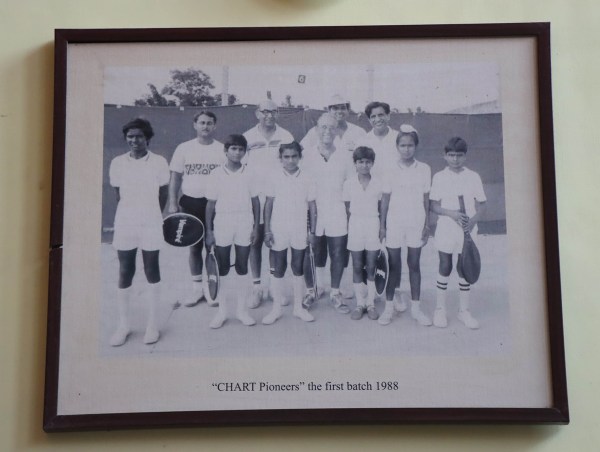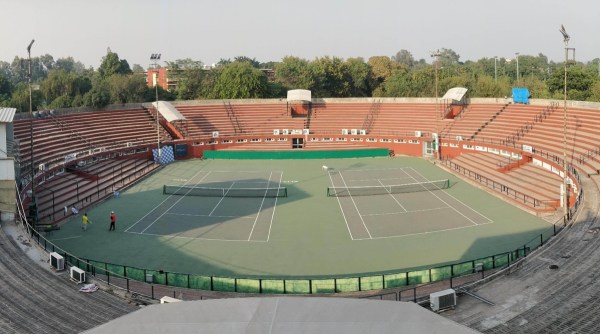It was a sunny day in 1989 when 1972 Olympics Indian hockey team bronze medallist Dr Vece Paes accompanied his 16-year-old son to Chandigarh where his son was participating in the ITF Juniors Tournament at the CLTA (Chandigarh Lawn Tennis Association) Tennis Stadium in Chandigarh. The prodigal youngster called Leander Paes would win his first ITF title at the grass courts of CLTA and would then win the junior Wimbledon boys title. Months after the feat, the younger Paes would play in the India-Japan Davis Cup tie at the same stadium under the captaincy of Naresh Kumar in 1990. Partnering Zeeshan Ali in the doubles match of the tie on March 31, 1990, Paes would win the doubles tie along with Ali against the Japanese pair of Shuzo Matsuaka and Shigeru Ota to hand India a 3-0 lead in the match with India winning the tie 4-1 eventually.
“One of the first things which I admired about the CLTA Tennis Stadium was the fact that it was purely a dedicated tennis arena, which was not the case in some of the tennis centres in the country at that time. Chandigarh is a lovely city and the tennis stadium here gives one a calming experience situated amid the gardens. When Leander won his first ITF Juniors title here, he was very excited like any young kid of his age and it remains his best memories of his junior career,” said Dr Vaes Paes.
While the young Paes was aged 16 and nine months at the time of making his Davis Cup debut for India, the Kolkata player impressed the then Indian Davis Cup captain Naresh Kumar. With the CLTA stadium holding its first-ever Davis Cup tie, it was a special moment for the city’s elite and tennis aficionados. With India winning the tie, it meant that Leander started his Davis Cup career with a win for India. The next 32 years saw Leander making a record of having the most doubles wins in Davis Cup, a record envied by many. “Prior to the Davis Cup tie against Japan, I met Indian captain Naresh Kumar at Kolkata Race Course and Kumar was very excited about Leander. He told me that he wants Leander in the team and I told him that it’s his choice as the captain of the team. Initially, Leander went to Chandigarh as the hitting partner for Rohit Rajpal but on the day of the draw, Kumar decided to hand Leander his Davis Cup debut. Leander and Zeeshan Ali won the doubles match and Leander would tell me later that it was nothing short of a festival in Chandigarh at that time. Later, Leander and I were associated with CLTA for more than 14 years conducting coaching clinics and being on the advisory committee,” remembers the elder Paes.
The last 30 years have also seen CLTA imparting training to rural kids under the CHART programme started in 1992. credit: express photo
While the Chandigarh Lawn Tennis Association was formed on September 17, 1975, it was not until 1987 that the association got its own stadium. From 1975 till 1987, CLTA held its tournaments at Chandigarh Club and Panjab University courts, where exhibition tournaments would be conducted. While players like Ramanathan Krishnan, Akhtar Ali, Nandan Bal competed in these tournaments apart from former IPs and Pondicherry Lt Governor Kiran Bedi, one such exhibition match saw the then Indian legend 38-year-old Ramanathan Krishnan compete against his 14-year-old son Ramesh Krishnan. The youngster would beat his father in the match. “I have been visiting Chandigarh since the early 1970s. Chandigarh used to be our stop after the coaching camp in Patiala. I won my first men’s tournament here in 1976 and it was a turning point in my career. My recollection is the match happening in front of temporary seats (Panjab University). I also had the opportunity to chaperone my daughter who competed in the ITF Junior Tournament here. I also cherished my meetings with the late Shri Milkha Singh in Chandigarh,” said Ramesh Krishnan, one of India’s most successful players in Davis Cup history.
It was in the late 1970s that the Chandigarh Administration made plans about making a tennis stadium in the City Beautiful. With MG Devasahayam, who was the Deputy Commissioner of Chandigarh at that time being also the founding president of CLTA, the UT Administration first earmarked the north western part of the Rose Garden as the designated place for the tennis stadium. While Ramanathan Krishnan laid the plaque for the stadium, lack of space meant that the venue for the stadium was shifted to the present place in the Leisure Valley in front of DAV College. The stadium was completed in 1979. On January 1, 1987, CLTA got the stadium for a 10-year-long lease from the UT Administration. “MG Devasahayam was very passionate about tennis and the UT Administration at that time came up with a plan of allocating the budget of two community centres for the new tennis stadium. Chief architect MN Sharma and his team along with chief engineer Kulbir Singh came up with the design of the stadium resembling the Rome Colloseum. The stadium was built in such a way that each spectator can view the match in the stadium with a clear view of the action. We also planted many trees, including Jamun and Mulberry trees, in the stadium. In 1989, the then Punjab governor S S Ray and Haryana governor H A Brari competed in the hot weather tournament at the stadium,” remembers Rajan Kashyap, founding member and former president of CLTA.
 The prodigal youngster called Leander Paes would win his first ITF title at the grass courts of CLTA and would then win the junior Wimbledon boys title. Months after the feat, the younger Paes would play in the India-Japan Davis Cup tie at the same stadium under the captaincy of Naresh Kumar in 1990.
The prodigal youngster called Leander Paes would win his first ITF title at the grass courts of CLTA and would then win the junior Wimbledon boys title. Months after the feat, the younger Paes would play in the India-Japan Davis Cup tie at the same stadium under the captaincy of Naresh Kumar in 1990.
While the stadium hosted its Davis Cup tie in 1990, it got the chance to host one of the biggest Davis Cup tie in the form of India-Australia Davis Cup World Group semi-final played from September 24 to September 26, 1993. With the Australian team boasting of Wally Masur, Jason Stoltenburg, Mark Woodforde and Tood Woodbridge and the Indian team having the likes of Ramesh Krishnan,Leander Paes, Gaurav Natekar and Zeeshan Ali, it was a showcase event for Indian tennis and the occasion saw the presence of David Ewans, the then Australian High Commissioner to India apart from the then Punjab governor Surendra Nath, Punjab CM Beant Singh and Haryana CM Bhajan Lal. India lost the tie 5-0 against the Aussies. “CLTA got six weeks to prepare when AITA decided to host the all important Davis Cup World group semi-final tie at Chandigarh.I was the CLTA president at that time and my team including CLTA secretary S Marriya would leave no stone unturned for the tie. Initially the Australians had an impression that Chandigarh is a remote place in Chandigarh and they came prepared with all their food. But when they reached Chandigarh, they were surprised to see the facilities here and the gardens near the stadium.”
The stadium hosted its third Davis Cup tie in the form of the India-New Zealand tie from September 14 to September 16, 2012. With India winning the tie 5-0, there was a festive atmosphere at the stadium. Kashyap keenly remembers an incident during the tie. “On one of the days, a newborn child was found abandoned by a stadium staff near the Leisure Valley close to the CLTA Stadium. The CLTA staff took care of the baby before she was taken to an orphanage in the city. We don’t know where that child is now but CLTA doors are always open to the child,” remembers Kashyap.
 While the stadium has not hosted a Davis Cup tie with the last one between India and South Korea in 2016 happening at Chandigarh Club, the stadium awaits its next big tournament. credit: express photo
While the stadium has not hosted a Davis Cup tie with the last one between India and South Korea in 2016 happening at Chandigarh Club, the stadium awaits its next big tournament. credit: express photo
The Stadium also played host to future US Open champion Emma Raducanu. In 2018, a young Raducanu had come to compete in the ITF Grade-3 Tournament at CLTA Stadium and the youngster won the title here. “Emma had come along with her mother Renne to compete here at CLTA and when she won the title here, she made sure to thank all the coaches and supporting staff here. It remains a special moment for CLTA,” says CLTA chief coach Romen Singh.
The last 30 years have also seen CLTA imparting training to rural kids under the CHART programme started in 1992. Sunil Kumar, from Kapurthala, who went on to become the Indian champion in 1999, is one of the products. “Initially when we recruited for the CHART programme, a boy ran away due to the practice schedule. But then the motive has been to spot talent from rural areas and impart them free scholarships,” says Kashyap.
While the stadium has not hosted a Davis Cup tie with the last one between India and South Korea in 2016 happening at Chandigarh Club, the stadium awaits its next big tournament.





